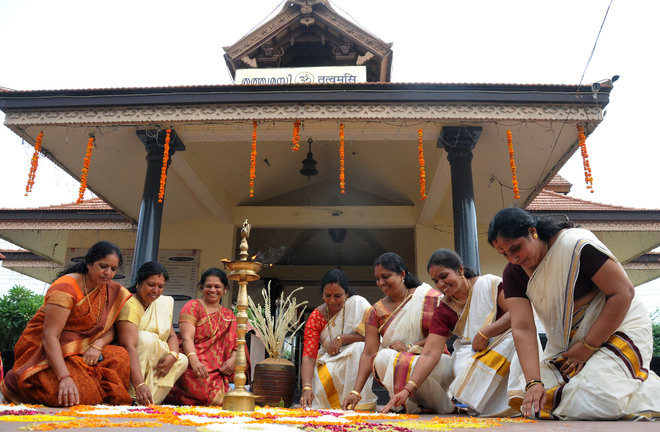Manav Mander
Tribune News Service
Ludhiana, August 28
Living away from the land of coconut trees, Keralites settled in the industrial city didn’t miss the opportunity to assemble and celebrate Onam. People from the community today got together at Shree Ayyappa Temple to relish ‘Onam Sadhya’ and spent some quality time recalling the age-old customs and traditions.
Women were dressed in the customary outfits. ‘Kesav sarees’ (white sarees with golden border) for women and ‘mundu’ (white dhoti with golden border) for men was the dress for the day.
After performing ‘Pooja’ of their traditional God, lamps were lit in the temple and women made ‘athapookalam’ (rangoli with flowers). In the end, a lavish feast ‘Onam Sadhya’ was served to the gathering.
“Onam symbolises the dawn of the new season of happiness and prosperity and is an occasion to share love, peace and togetherness. It is a festival celebrated annually by all the Keralites, weather at home in Kerala or elsewhere and it coincides with the arrival of new crops,” said PN Remanan.
It is essentially a 10-day festival celebrated with great fervour between August and September. The festival is celebrated to welcome the homecoming of their dearest legendry King Mahabali into their homes. It is believed that the spirit of the king visits the homes of the people at the time of Onam.
During the festival, various activities are organised such as boat racing, music, dance and fireworks among others, said Rajan Nair.
The best part of the celebrations today was ‘Onam Sadhya’. While in earlier times it comprised of more than 60 dishes, these days the number of dishes have reduced.
“Earlier, women of the house use to prepare the meal a day in advance and the entire night before the day of Onam was spent in the kitchen but now, with the passage of time, the number of dishes has come down as per the choice of the family,” says Anusha Pillai.
“I try to make as many dishes as possible since it is a tradition we follow and my family loves the Onam Sadhya. I also make it a point to serve the ‘Onam Sadhya’ on banana leaves lending authenticity to the entire experience,” she added.
The dishes are always served in courses and eaten in a specific order. The first course comprises rice, dal (parippu) along with ghee, followed by rice with sambar. The third course includes rice with ‘rasam’ and ‘pulisherry’, followed by rice with curd/buttermilk. Then comes ‘payasam’ and ‘ada pradhaman’.
As for desserts, many start the meal with it, most have it in between the meals and others finish off on a sweet note.
“There are a handful of semi-dry preparations that are served in the beginning to keep consuming them throughout the meal. These usually include cabbage ‘thoran’, avial, ‘pachadis’, curries made of red pumpkin (erisherry) and ‘bhindi’ (vendakai kichdi). You also have some salt and a banana placed on your banana leaf along with salted banana wafers and jaggery coated banana chips,” explains Pillai.
Unlock Exclusive Insights with The Tribune Premium
Take your experience further with Premium access.
Thought-provoking Opinions, Expert Analysis, In-depth Insights and other Member Only Benefits
Already a Member? Sign In Now










